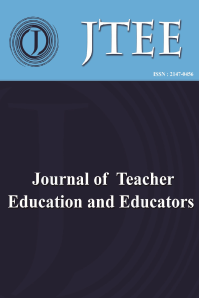İngilizce Yeterlilik Endeksi Verileri Işığında Türkiye’nin Yeri
Education First (Önce Eğitim) İngilizce Yeterlilik Endeksi standardize edilmiş İngilizce seviye tespit sınavıdır ve amacı bir ülkenin İngilizce yeterlilik seviyesini ölçmektir. 2014 yılı endeksinin verilerine göre Türkiye, altmış üç ülkenin sıralamasında kırk yedinci sırada yer almıştır. Çalışmanın amacı İngilizce Yeterlilik Endeksi tarafından sunulan verilerin ve raporların bilgisi ışığında, kırk yedinci sırada yer alan Türkiye’deki İngilizce öğretimi uygulamalarını ve stratejilerini aynı endekste birinci sırada yer alan Danimarka ile karşılaştırma yöntemiyle araştırmaktır. Araştırmanın sonucunda, bir ülkenin İngilizce yeterlilik seviyesinin yüksek olmasında o ülkenin okullaşma oranının ve müfredat programlarında İngilizcenin zorunlu ders olarak okutulmasının en önemli etkenler olduğu saptanmıştır. Durum Türkiye ve Danimarka açısından değerlendirildiğinde Danimarka ’da neredeyse tüm öğrencilerin lise mezunu olması nedeniyle dünyada en iyi İngilizce bilenler seviyesine ulaştıkları buna karşılık Türkiye’nin Danimarka’nın gerilerinde yer aldığı görülmüştür. İngilizce yeterlilik sınavına Türkiye ve insani gelişme endeksine göre en gelişmiş ülkeler arasında yer alan Danimarka ile aynı koşullarda başlamamış olmaları bu durumun temel nedenleri arasında sayılabilir. Bununla birlikte Türkiye’de son dönemde dil öğretiminde gerçekleştirilen belirgin müfredat değişiklikleri ve özellikle de 2012 yılı reformunun Türkiye’ye hız kazandıracağı söylenebilir
Anahtar Kelimeler:
İngilizce Yeterlilik Endeksi, dil ölçme, Türkiye, Danimarka
Turkey’s Place in the Rankings of The English Proficiency Index
The Education First English Proficiency Index is a standardized test aiming to measure a country’s level of English proficiency. The index gathered the measurements of adult English proficiency from a total of sixty three countries. According to the data of the 2014 index, Turkey ranks at the forty seventh position. Based on this index, the present research investigates why Turkey has scored so low by focusing on comparing Turkey’s various practices to those of Denmark, a country ranking at the first position on the index. According to the findings, the most important factors which are influential in enhancing a country’s level of English proficiency are the years of schooling and the defining of English proficiency as a core competency within the school curricula. In Denmark, a country which is classified to have very high human development, the majority of students have completed secondary education. From this aspect, it can be stated that in this proficiency test Turkey and Denmark have not participated on equal terms. However, contemporary efforts in the teaching of English in Turkey and notably the reform in education in 2012 have been influential in enhancing Turkey’s level of English proficiency
Keywords:
English Proficiency Index, language testing, Turkey, Denmark,
___
- Arslan, R. S. (2012). “Bridging the gap between policy and practice in teaching Eng- lish to young learners: the Turkish context”. Pamukkale University Journal of Education, Number 32 (July 2012/II), 95 -100.
- Choudaha, R., Chang, L., & Kono, Y. (2013). International student mobility trends 2013: Towards responsive recruitment strategies. New York, NY: World Edu- cation Services. Retrieved from http://www.wes.org/RAS 11.05.2015
- Çekim, M. (2014). Income Equality and Education in Turkey 1980-2005. (Unpublis- hed M.A. Thesis). Lund University School of Economics and Management. Ju- ne 2014. Sweden.
- Dogancay-Aktuna, S. (1998) “The Spread of English in Turkey and its Current Socio- linguistic Profile”. Journal of Multilingual and Multicultural Development, 19:1, 24-39.
- DME-a. (2013). Website of the Danish Ministry of Education. Retrieved from http://eng.uvm.dk/Education/Themes/Education-and-skills-upgrading-for- all/Goals-for-a-world-class-education-system. 11.01.2015
- DME-b. (2013). Website of the Danish Ministry of Education. Retrieved from http://eng.uvm.dk/~/media/UVM/Filer/English/Fact%20sheets/080101_fact_she et_the_folkeskole. 11.01.2015
- EEE. (2013). Eurypedia European Encyclopedia. Retrieved from http://eng.uvm.dk/~/media/UVM/Filer/English/PDF/131007%20folkeskolerefor maftale_ENG_RED.ashx. 11.01.2015
- EF EPI. (2011). EF English Proficiency Index. Education First. Retrieved from http://www.ef.com/sitecore/__/~/media/efcom/epi/pdf/EF-EPI-2011 20.12.2014
- EF EPI-a (2014). EF English Proficiency Index. Education First Retrieved from http://media.ef.com/__/~/media/centralefcom/epi/v4/downloads/full-reports/ef- epi-2014-english.pdf. 20.12.2014
- EF EPI-b (2014). EF English Proficiency Index (Country Fact Sheet, Turkey). Edu- cation First. Retrieved from http://media.ef.com/sitecore/__/~/media/centralefcom/epi/v4/downloads/fact- sheets/ef-epi-country-fact-sheet-v4-tr-en.pdf. 20.12.2014
- HDR. (2013). Human Development Report. United Nations Development Prog- ramme. Retrieved from http://hdr.undp.org/sites/default/files/Country- Profiles/DNK.pdf. 05.12.2014
- Koru, S., and J. Akesson (2011). Turkey’s English Deficit. TEPAV (Economic Po- licy Research Foundation of Turkey), Policy Note. December 2011, N201157. Retrieved from www.tepav.org.tr 19.12.2014
- McNamara, T. and C. Roever. (2006). Language Testing the Social Dimension. Blackwell Pub. U.K.
- MEB. (1997). Milli Eğitim Bakanlığı 4. ve 5. Sınıflar İngilizce dersi programı (Tur- kish Ministry of National Education English language curriculum for grades 4 and 5 at elementary education). Tebliğler Dergisi. No: 2481, p.606. Ankara: MEB Yayımlar Dairesi Başkanlığı.
- MEB. (2012) Milli Eğitim Bakanlığı Temel Eğtitim Genel Müdürlüğü (Turkish Mi- nistry of National Education Directorate General of Basic Education) . Retrie- ved from http://tegm.meb.gov.tr/www/201220-sayili-genelge- aciklamasi/icerik/2 19.12.2014
- MEB. (2013). Turkish Ministry of National Education. Retrieved from http://ttkb.meb.gov.tr/meb_iys_dosyalar/2014_09/26103033_ingilizce_9_12_tas lak.pdf. 20.12.2014.
- OECD-a. (2014) Website of Organisation for Economic Co-operation and Develop- ment. Retrieved from http://www.oecdbetterlifeindex.org/countries/turkey/ 05.01.2015
- OECD-b. (2014) Website of Organisation for Economic Co-operation and Develop- ment. Retrieved from http://www.oecdbetterlifeindex.org/countries/denmark/ 05.01.2015
- Pekkanlı, I. (2011) “From mother-tongue nationalism to plurilingual European citizens – the case of Turkey”. Linguistic D iversity and Cultural Identity: A Global Perspective, Chapter 8. Editors: Thao Lê and Quynh Lê. Nova Science Pub.
- Sebüktekin, H. (1981) Yüksek Ögretim Kurumlarımızda Yabancı Dil İzlenceleri, (Foreign
- Language Curricula in Institutes of Higher Education). Istanbul: Boğaziçi Uni. Pub.
- ISSN: 2147-0456
- Başlangıç: 2012
- Yayıncı: İlknur GÖKÇE
Sayıdaki Diğer Makaleler
İngilizce Yeterlilik Endeksi Verileri Işığında Türkiye’nin Yeri
Sosyokültürel Bir Bakış Açısıyla İki Dilli / İDİ Öğretmen Adaylarının Kimliği
Yunan Okul Müdürlerinin Öğretmenlerin Performanslarını Değer- lendirmeye Yönelik Yeterlik İnançları
Kalliope KALTSONOUDİ, Anastasia Athanasoula-Reppa
Ortaokul Öğrencilerinin ve Öğretmenlerinin Öğrenme ve Öğ- retmeye İlişkin Metaforik Algıları
Özlem URAL, İbrahim AYDEMİR, Asiye TOKER-GÖKÇE, Zehra ÖZTOPRAK-KAVAK
Bir Öğretmenin Eğitim Programının Yapılanması: Teknolojik Uyarlama İçin Bir Strateji
ángela María Alfaro ESCOBAR, Marcela Georgina Gómez ZERMEÑO, Lorena Alemán De La GARZA
